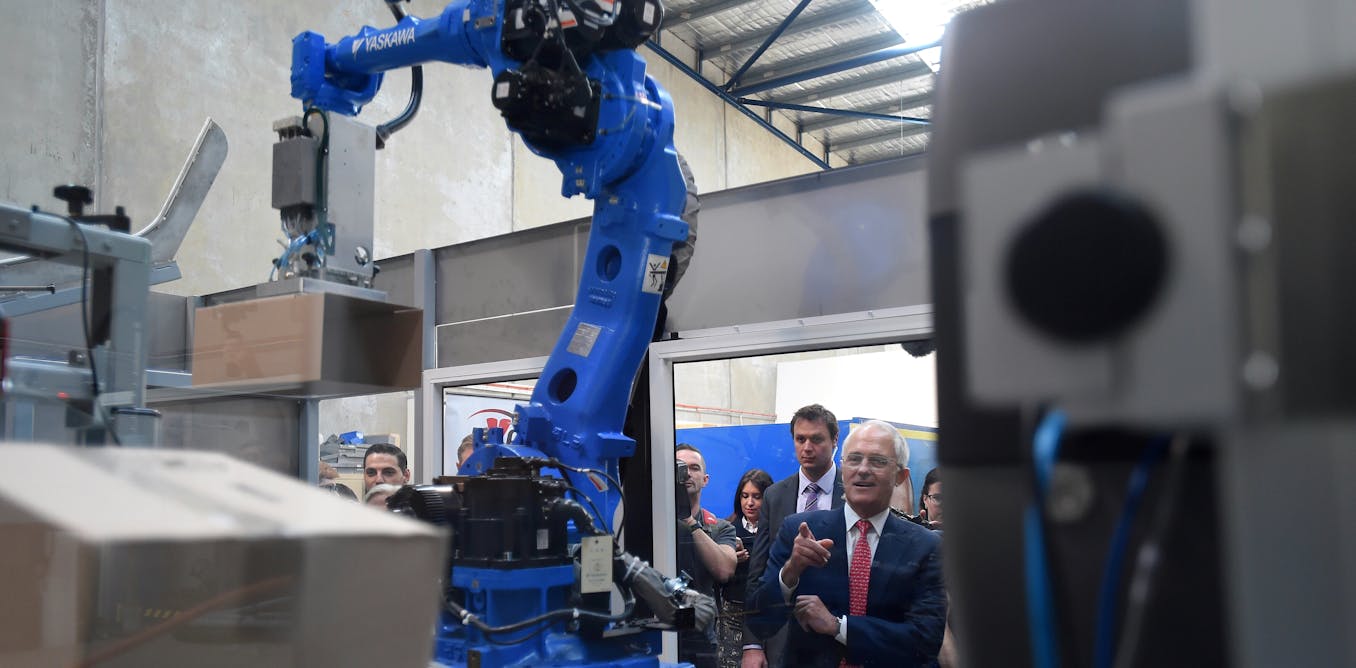The benefits of job automation are not likely to be shared equally

While companies might reap significant gains in productivity from automating certain jobs, this won’t necessarily lead to pay rises for everyone. The evidence suggests businesses might pass on the gains to some workers, but not to all.
Some 40% of all jobs are predicted to disappear with automation in Australia. The jobs most likely to go first will be those that can be easily codified, those that are repetitive, simple, structured or routine: think of jobs in manufacturing or those that involve form processing or driving a vehicle.
More than three decades ago, the economics Nobel Laureate, Robert Solow wrote that:
…you can see the computer age everywhere but in the productivity statistics.
At the time Solow’s comment created intense discussion, especially in the context of the spread of technology. But it has recently been challenged.
Now we are starting to see the effect of automation everywhere and especially in productivity and economic growth statistics. It’s expected that automation will make a A$2.2 trillion boost to productivity in Australia between 2015 and 2030. But whether productivity gains will be redistributed equally, remains highly questionable.
The growing divergence
There is a general economic argument that workers’ wages should grow in line with productivity growth and in doing so improve everyone’s living standards. Although there is overwhelming data about rising economic surpluses from automation, recent evidence indicates that the growth of productivity and the growth of workers’ wages are not actually linked.
Read more: Is faster profit growth essential for a pick-up in wages growth?
For example, in the United States, research shows a large divergence between productivity and median hourly compensation growth, from 2000 to 2011. Similarly, in Australia, we found wage growth lagging productivity growth, across most sectors of the economy. Average productivity growth was much higher than average wage growth in most sectors of the Australian economy during 2012-16.
Since the 1970s, across most OECD countries, the share of income going to wages has been decreasing, and the share being reinvested in capital (for instance cash reserves, equipment and machinery) has been increasing.
Clearly, profits arising from productivity gains have been going to capital rather than labour, reflecting growing income inequality in general.
Where the benefits of automation do go
Automation eliminates or replaces many routine tasks performed by people at work. Research shows a growing polarisation in the job market, where highly skilled and educated workers are commanding good jobs, while those in unskilled roles or positions with lower levels of education required are low paid.
Given that highly skilled workers are in high demand, these workers are more likely to receive the financial gains from automation or others in mid or senior level managerial roles. Indeed, CEO compensation has been growing much faster than average workers’ wages.
The ratio of CEOs’ pay to workers’ average pay in large US corporations was 20:1 in 1965, and it rose to a whopping 271:1 in 2016. What these signs point to is that those with less bargaining power are less likely to reap the rewards from productivity gains from automation.
Wage expectations of the tech savvy worker
When real (human) workers produce more by putting in more time or energy, they expect, and agitate for, an increased share of the gains. But when automation (and not longer hours or more sweat) leads to increased productivity, and subsequently increased profits, it’s less clear which workers should (or could) receive the increased share of the gains.
Businesses also don’t have an incentive to distribute a share of the gains back to the workers. We can see this for example in pharmaceutical services, which are becoming increasingly automated, yet workers are faced with low starting salaries. In such a highly competitive industry, the businesses are instead incentivised to pass on the gains to customers in terms of lower prices of goods and services they offer, rather than wages.
In economics, we often say that a rising tide lifts all boats. What we mean by that is that everyone benefits from economic growth and productivity.
But it’s not clear this will happen in an automated world. In the immediate future, there is no evidence to suggest that economic surplus from automation will be used to fund higher wages.
Workers may see some reward if their skills are valuable, rare and difficult to codify and automate. This value of being in high demand may be the incentive for workers to reskill or to look at how they organise to negotiate their share of the rewards.
http://theconversation.com/the-benefits-of-job-automation-are-not-likely-to-be-shared-equally-90859
Tidak ada komentar